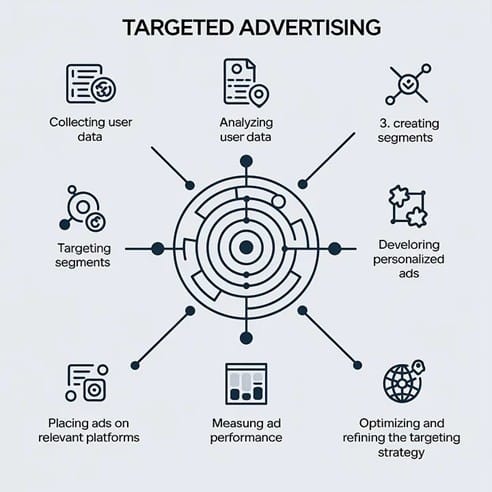In the era of digital-first, targeted advertising is a new norm of modern marketing campaigns. Studies suggest that businesses that utilize targeted ads experience as much as a 50% increase in engagement levels. By utilizing customer data, ranging from browsing history to demographic data, businesses can make hyper-relevant ads, achieving the best engagement and conversion rates. As it continues to expand, so does the ethical concern over the practice. While targeted advertising makes advertising more effective, it comes with significant consumer privacy, data protection, and algorithmic discrimination issues.

The Ethical Dilemma of Targeted Advertising
AI is transforming the advertising industry as it enables brands to create highly targeted campaigns that reach their intended audiences. By analyzing vast amounts of consumer data, AI helps marketers predict buying behavior, optimize ads, and personalize content in real time.
Thus, businesses are able to offer personalized messages that align with the interests of individuals, which increases engagement and conversion rates. With AI-driven marketing revenue set to reach $36 billion in 2024, companies are investing more in automation software that streamlines their advertising campaigns. Additionally, 32% of marketing organizations have fully embraced AI, indicating growing reliance on machine learning and predictive analytics to enhance campaign performance.
Personalization is at the heart of AI-driven marketing and allows brands to promote content that is pertinent and meets customer expectations. A study by McKinsey & Company found that 71% of customers expect personalized experiences, which has led advertisers to leverage AI to dynamically customize ads.
“Personalization is not only a crucial capability, it’s one that punches above its weight, no matter whether the company is a digital native, a brick-and-mortar player, or a behind-the-scenes producer or supplier. Consumers don’t just want personalization, they demand it. With store and product loyalty more elusive, getting it right matters. Roughly 75 percent of consumers tried a new shopping behavior in the last 18 months, and more than 80 percent of those intend to continue with new behaviors,” McKinsey reports.
Regardless of whether through email marketing or social media advertising, AI identifies patterns in user behavior and adjusts messaging to help increase customer satisfaction.
Actually, 89% of marketing decision-makers think that personalization is important for their company’s success in the next three years, which further highlights the merit of AI in advertising. With the incorporation of AI, businesses can build deeper customer relationships and enhance their return on investment.
AI-powered targeting, however, brings up ethical questions about data privacy and consumer autonomy. While targeted ads are a boon to user experience, they are accompanied by the gathering and processing of personal data, which can be seen as intrusive if not carried out transparently. There is a fine line between helpful recommendations and excessive surveillance and hence the questions of consent and data security arise. As AI is used more, companies must balance innovation with ethical responsibility by making data collection practices transparent and within the parameters of privacy regulations. Achieving this balance is imperative to maintaining consumer trust in an increasingly AI-driven marketing landscape.
Supporters of targeted advertising claim that it is beneficial to both consumers and businesses because it renders advertisements relevant, timely, and helpful. It theoretically minimizes irrelevant marketing noise and enhances user experience. Detractors indicate that the technique typically involves collecting and using personal data without clear consent, which leads to substantial privacy infringements.
Transparency is one of the main ethical concerns. Most consumers do not know the extent to which their online activity is tracked and leveraged for advertisement. Additionally, algorithmic decision-making has the potential to amplify societal biases and, unconsciously, result in discriminatory advertisement placement, such as financial services over-promoted to certain groups and under-promoted to others.
To illustrate this, consider the hypothetical example of a job search website unintentionally exposing men to more ads for better paying jobs than women, and women to more lower paying jobs, simply because the algorithm was trained on past biases. This type of unconscious bias is precisely why ethical regulation of targeted advertising is needed.

Expert Insight: Alina Kondrikova’s Perspective
Alina Kondrikova, Chief Marketing Officer at Finaeon, a leading US-based Global Financial Data company, offers a nuanced perspective on this issue. With extensive experience in ethical digital marketing, Kondrikova acknowledges the efficiency of targeted advertising but stresses the importance of consumer trust and responsible data usage.
Marketing should be a bridge, not a barrier, between businesses and consumers. To build sustainable customer relationships, brands must prioritize transparency, consent, and fairness in their advertising practices.
She advocates for a marketing approach where consumers are fully informed about data collection practices and given the choice to opt in rather than being subjected to passive data tracking. This approach aligns with the rising consumer demand for privacy-conscious brands and ensures businesses maintain a trustworthy reputation.
The Case for Ethical Marketing Practices
Kondrikova’s stance highlights a crucial shift in the industry. Ethical advertising is not just a regulatory necessity, it’s a competitive advantage. With evolving global data protection laws such as the General Data Protection Regulation (GDPR) and the California Consumer Privacy Act (CCPA), businesses that proactively implement transparent data policies can avoid legal pitfalls while fostering long-term customer loyalty.
In addition to compliance, ethical marketing practices create a brand image that resonates with socially conscious consumers. Companies that respect privacy, avoid manipulative advertising techniques, and uphold fair data usage policies are more likely to retain customer trust. This trust, in turn, translates to higher engagement and long-term brand advocacy.
Consider Apple’s strong stance on user privacy, which has significantly contributed to its brand loyalty. By positioning itself as a champion of consumer rights, Apple has successfully differentiated its products in a crowded market while maintaining consumer confidence.
Finding the Balance: Business Efficiency vs. Consumer Privacy
The debate over targeted advertising underscores the delicate balance between business objectives and ethical responsibility. While data-driven marketing enhances precision and profitability, it must not come at the expense of consumer rights.
Industry leaders like Alina Kondrikova stress that prioritizing transparency and consumer choice is not only ethically responsible but also strategically beneficial. In an era where data privacy concerns are at the forefront of public discourse, businesses that embrace ethical advertising will be better positioned for long-term success.
As digital marketing continues to evolve, ethical considerations must remain a guiding principle. Companies that commit to responsible data practices will not only comply with regulations but also build stronger, trust-driven relationships with their audiences, ensuring both ethical integrity and sustainable growth in the ever-changing digital landscape.
The Path Forward for Businesses
For businesses looking to refine their approach, the key takeaway is clear. Ethical advertising isn’t just about following the rules, it’s about fostering lasting connections with consumers by respecting their choices and valuing their privacy. Companies that proactively implement fair and transparent advertising practices will not only avoid regulatory pitfalls but also differentiate themselves as leaders in the modern, privacy-conscious marketplace.











